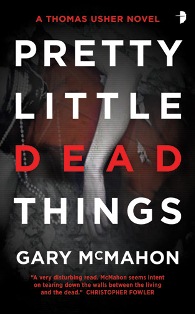
First published in November of 2010, ‘Pretty Little Dead Things’ formed British author Gary McMahon’s first instalment into his ‘Thomas Usher’ series, neatly setting down the back-story to the principal protagonist’s emotionally devastating life.
DLS Synopsis:
Thomas Usher’s life is torn apart when he is involved in a tragic car accident that sees the death of his wife and young daughter. Furthermore, after waking from the accident, Usher finds that he now has the ability to see the ghosts of the dead. But this only worsens Usher’s emotional state which has spiralled into a near abyss of depression.
Now, with a number of years having passed since the accident, Usher is beginning to claw back a life for himself. A self-employed private investigator with the added ability of being able to pick up messages from the dead; Usher finds himself thrown into the middle of a case involving the horrific murder of three young women.
A missing child named Penny Royale becomes entwined in the case, brought to Usher’s immediate attention by a close friend of his past – a woman who meant almost as much to him as his wife had. On the hunt for a lead on the murderer of three young women and the abductor of Penny Royale, Usher begins to unearth a terrible secret surrounding his current employer - the prominent urban gangster Baz Singh, whose daughter was the last victim of the killer. Somehow it is all connected. And at the roots of the underground pornographic sex trade, are the beginnings to unravelling the mystery.
Usher will find himself more immersed in the dark secrets involved than he would ever have thought. Lurking behind it all is a power so depraved that it transcends our day-to-day world. Usher must face and overcome his own demons to get to the root of the ultimate evil that is haunting the streets of Leeds…
DLS Review:
Written entirely in the immediate first-person-perspective, McMahon’s depressively sinister tale begins by setting down a storyline that initially appears to lean towards that of a gritty crime novel. However, as Usher’s backstory and his tragically acquired spiritual abilities begin to take precedence over the storyline, so the more supernaturally charged and altogether more ‘horror’ elements begin to swiftly infiltrate the tale.
McMahon spends a vast proportion of the novel painstakingly setting down the backstory of the principal protagonist - Thomas Usher. Indeed, the complex characterisation of Usher almost takes precedence over the main thrust of the tale. This in no way hurts the flow of the storyline, but with its ever-entwining threads, successfully draws the character (and in turn the reader) deeper and deeper into the darkness of the entire plot.
Almost a clone copy of Clive Barker’s character Harry D’Amour (‘The Last Illusion’ (1986), ‘The Great And Secret Show’ (1989), ‘Everville’ (1994) etc), the character of Usher seems to have been formed from the same blueprint as this much loved character – yet McMahon has chiselled out his own twist on the character’s personality and his deeply troubled emotional state.
Where the novel succeeds above all else is in the atmosphere McMahon skilfully manages to inject. There is torment behind every page. There is evil lurking everywhere. McMahon’s wordplay is almost poetic in its delivery throughout the entirety of the tale, capturing the downbeat mood and underlying malevolence with each descriptive and emotionally charged sentence.
When the plot is firmly set, McMahon comes into his own, setting down haunting and horrific images; each one vividly depicted and designed to appal and then cauterise your senses. The novel gradually succumbs to an overwhelming need for corruption. It’s dark and twisted underbelly is slowly exposed, as piece by piece, Usher unearths the truth lying behind the murders and abduction.
The novel spirals towards a monumental ending of all-out-horror, mounting up darkly imaginative images baring an uncanny resemblance to the likes of Clive Barker, Mark Morris and even the lucid mutations of John Carpenter’s film ‘The Thing’ (1982) for good measure.
The book’s acknowledgments read like a list of the author’s influences. In particular Mark Morris, Sarah Pinborough and Ramsey Campbell – whose imagination seems always eager to corrupt the reader with their stark images of grotesque supernatural monstrosities.
Also included in the book is a 16 page short story entitled ‘The Late Show’. The short is an offshoot story which was briefly referred to within the storyline of ‘Pretty Little Dead Things’.
The Late Show - 16 pages
Usher escorts his friend Professor Theo Dryer to a strange and somewhat secretive location where they are met by a number of other similarly puzzled individuals, each of whom have also been invited to attend an intriguing yet sinister presentation. For they are all about to witness something that should never have existed. A tape has been found in the basement of an old derelict asylum that is thought to be haunted. A tape that has since only been watched by two people. Two people who were driven insane by the footage. The only words that they repeated over and over after watching the footage were that they have now seen the face of the devil…
For a short, McMahon manages to create such a wealth of dark atmosphere and unnerving tension that seems to swamp the entirety of the text. The suspense before the actual viewing of the tape is masterful and the execution of the final results is equally as fitting and intense. The short serves to shed a little more light on Usher’s complex backstory, whilst delivering a brief but impactful tale that grips and unnerves from the beginning to the end. Excellent stuff.
The book runs for a total of 332 pages, of which 312 pages are for the principal tale.
© DLS Reviews






